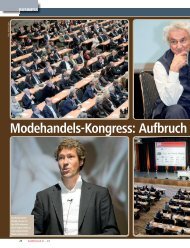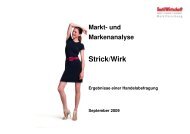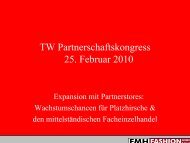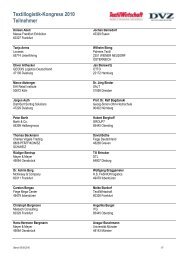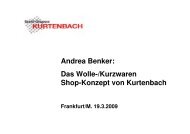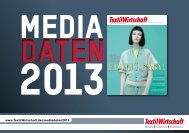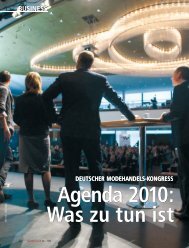UNIQLO Operations - TextilWirtschaft
UNIQLO Operations - TextilWirtschaft
UNIQLO Operations - TextilWirtschaft
Create successful ePaper yourself
Turn your PDF publications into a flip-book with our unique Google optimized e-Paper software.
<strong>UNIQLO</strong> All-Product Recycling<br />
What You May Not Need, Someone Else Does<br />
<strong>UNIQLO</strong>’s Clothes Recycling Expanded<br />
from Fleeces to All Products<br />
The first items <strong>UNIQLO</strong> began to recycle were its fleeces.<br />
These items were widely used and loved by <strong>UNIQLO</strong><br />
customers, but, when they were no longer needed and<br />
discarded, they place a burden on the environment.<br />
Determined to address this problem seriously, <strong>UNIQLO</strong><br />
began fleece-recycling activities.<br />
Beginning in September 2006, these recycling activities,<br />
which began with fleeces, have been expanded to<br />
include “all products sold in <strong>UNIQLO</strong> stores.” Recycling<br />
campaigns are held every year in March and September<br />
at <strong>UNIQLO</strong> stores.<br />
Most Items Received from Our Customers<br />
Can Still Be Worn<br />
Under <strong>UNIQLO</strong>’s recycling campaigns, customers are<br />
requested to bring used clothing to <strong>UNIQLO</strong> stores. In<br />
September 2006, about 140,000 items were collected for<br />
recycling, and this figure expanded to 300,000 items in<br />
March 2007 and then to 430,000 in September 2007.<br />
About 90% of these items were still in wearable condition.<br />
We believe that the best way to respond to the<br />
goodwill of customers is to reuse the garments customers<br />
have left with <strong>UNIQLO</strong> for recycling.<br />
We made inquiries at various international organizations<br />
and considered differing methods for making these<br />
items available for reuse. We learned that making garments<br />
available for reuse is more difficult than we had<br />
imagined, and had to solve a range of problems. These<br />
included providing for the costs of necessary storage,<br />
transportation, and distribution of the donated apparel<br />
items, making applications to the countries that would<br />
36<br />
Flow of <strong>UNIQLO</strong> All-Product Recycling<br />
Customers<br />
Collection Transport<br />
<strong>UNIQLO</strong><br />
Stores<br />
FAST RETAILING ANNUAL REPORT 2007<br />
Sorting<br />
facilities for<br />
recycling<br />
West Japan area<br />
East Japan area<br />
85%<br />
01%<br />
14%<br />
receive the items, the sorting and appropriate distribution<br />
of the garments, and the choice of partners to work with.<br />
After discovering that there were many constraints, we<br />
finally found our way to the United Nations High<br />
Commissioner for Refugees (UNHCR). Apparel items are<br />
in short supply at refugee camps, and <strong>UNIQLO</strong> items are<br />
able to fill these needs. To provide for the temporary storage<br />
of the apparel items and transport, we secured the<br />
full cooperation of the Japan Relief Clothing Center, a<br />
non-profit organization.<br />
<strong>UNIQLO</strong> bore the full burden of a series of costs,<br />
including transportation expenses, warehousing costs,<br />
and the cost of sorting the apparel items into men’s and<br />
women’s and by season.<br />
Items Delivered to Refugee Camps in<br />
Thailand, Nepal, Uganda, and Tanzania<br />
Decisions on which refugee centers the apparel items<br />
would be delivered to were made in consultation with<br />
UNHCR, based on the level of urgency and need. As a<br />
result, the apparel items recovered in September 2006<br />
were delivered to refugees in Thailand and Nepal (with<br />
deliveries actually made in February 2007). In addition,<br />
about 85% of the approximately 300,000 items recovered<br />
in the September recycling initiative were given to<br />
refugee camps in Uganda and Tanzania through UNHCR<br />
(with deliveries made in November 2007).<br />
There was concern about the possible adverse impact<br />
on local apparel industries when the apparel items were<br />
stolen or delivered. For this reason, <strong>UNIQLO</strong> employees<br />
and the <strong>UNIQLO</strong> executive officer in charge of CSR went<br />
to the local areas to confirm that apparel supplied by<br />
customers was actually delivered to their destination.<br />
Donation as relief provisions (reuse)<br />
● Transport<br />
NPOs (Japan Relief Clothing Center)<br />
● Reception and transfer<br />
UNHCR (United Nations High Commissioner<br />
for Refugees)<br />
Recycled into fibers<br />
Insulation and industrial fibers<br />
Recycled into fuel<br />
Power-generating fuel<br />
Refugee camps<br />
Thailand<br />
Nepal<br />
Uganda<br />
Tanzania<br />
These recycling activities are being undertaken with the cooperation of many groups of people, including our customers, other corporations,<br />
NPOs, UNHCR, and the recipient countries.<br />
Collection: Products that are no longer needed are directly collected from customers at <strong>UNIQLO</strong> stores.<br />
Sorting: The products are sorted at two facilities in Japan into either reusables or recyclables.<br />
Reuse: Reusable clothing is donated to refugees as relief provisions in cooperation with the UNHCR and NPOs.<br />
Recycling: Depending on the material recyclable clothing is used as fuel for electric power generation or as material for new fiber products.



